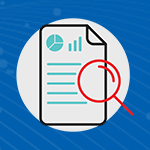Blog
5 benefits of using a call recording system in your hospital contact center
Your contact center is vital for shaping patient communication. One powerful, yet often overlooked tool that can significantly help your operators deliver high-quality service and ensure your hospital meets industry regulations is a call recording system.
To maximize the impact of every caller interaction, here are five reasons why contact center call recording software should be a core part of your operations.
1. Enhancing patient experiences
In today’s consumer-driven healthcare environment, hospitals understand the importance of providing a seamless and satisfying patient experience to remain the provider of choice.
Simple tasks, like checking in on a loved one, should be easy, informative, and leave a positive impression. With a contact center recording solution, supervisors can also review real conversations and assess their employees’ performance.
Call recorder software offers valuable training opportunities, helping operators balance human-tech interaction with professionalism and empathy. Without access to previous recordings, contact center leaders cannot effectively train their agents and improve patient communication.
2. Improving productivity
Metrics and insights are a tell-tale sign of success within your contact center. Otherwise, operators don’t know what they don’t know, leaving them without the tools or comprehension needed to excel at their roles.
Contact center call recording software goes beyond audio; it includes screen capture, offering a complete perspective of what’s said and what’s done during a call. This dual view can reveal areas for optimization, such as time-consuming tasks that can be streamlined with keyboard shortcuts or automated processes.
A call recording system helps your operators gain feedback and utilize tools they need to succeed—boosting individual performance and overall contact center productivity.
3. Understanding patient needs
Hospital contact centers are one of the most underutilized resources for gaining insights into patient priorities and enhancing care experiences.
If your healthcare organization receives hundreds—or even thousands—of inquiries every day but doesn’t use a contact center recording solution, you’re missing out on a valuable opportunity to tap into this rich source of information.
Contact center call recording software can provide information that helps your healthcare leaders answer critical questions like:
- Why are patients reaching out to your hospital?
- What kind of information are they consistently looking for? Can you make this information more accessible through your website, patient portal, or other channels?
- Are patients receiving the help they need quickly and effectively?
- Are they satisfied with their experience or not? And more importantly, why?
4. Preventing poor liability management
An analysis by The Joint Commission reveals that communication breakdowns are the leading cause of reported sentinel events.
While patient safety issues are often reviewed within clinical care teams, hospital contact centers also play a crucial role. Operators do much more than answer incoming calls. They have direct responsibilities for patient care by launching critical codes, issuing emergency notifications, and more.
In the event of a malpractice case or dispute resolution involving telecommunications, call recorder software allows supervisors to revisit the communication in question. These recordings can serve as vital evidence for reconstructing timelines, clarifying instructions, identifying gaps in compliance, and reinforcing accountability across departments.
5. Adhering to regulatory policies
Hospital contact centers are subject to the same regulatory requirements as other areas of healthcare operations. HIPAA mandates the protection of patient health information (PHI) in all forms, including verbal communications.
With operators frequently handling this sensitive patient data over the phone, these interactions must be managed with the same level of care and security as clinical documentation.
Contact center call recording software is essential for demonstrating HIPAA compliance. In the event of an audit or investigation, these recordings provide clear evidence that appropriate procedures have been followed and reduce the risks of penalties.
Implementing contact center recording solutions offers a wide range of benefits that go beyond basic quality assurance, providing valuable insights that support better decision-making and patient communication. As hospitals and health systems navigate the complexities of the modern medical landscape, call recorder software is not a wise choice; it’s a critical step towards more efficient and patient-centered care.
Want to learn more? Read the essential guide on hospital contact centers.
Editor’s note: This post was originally published in April 2018 and has been updated for relevancy and accuracy.







